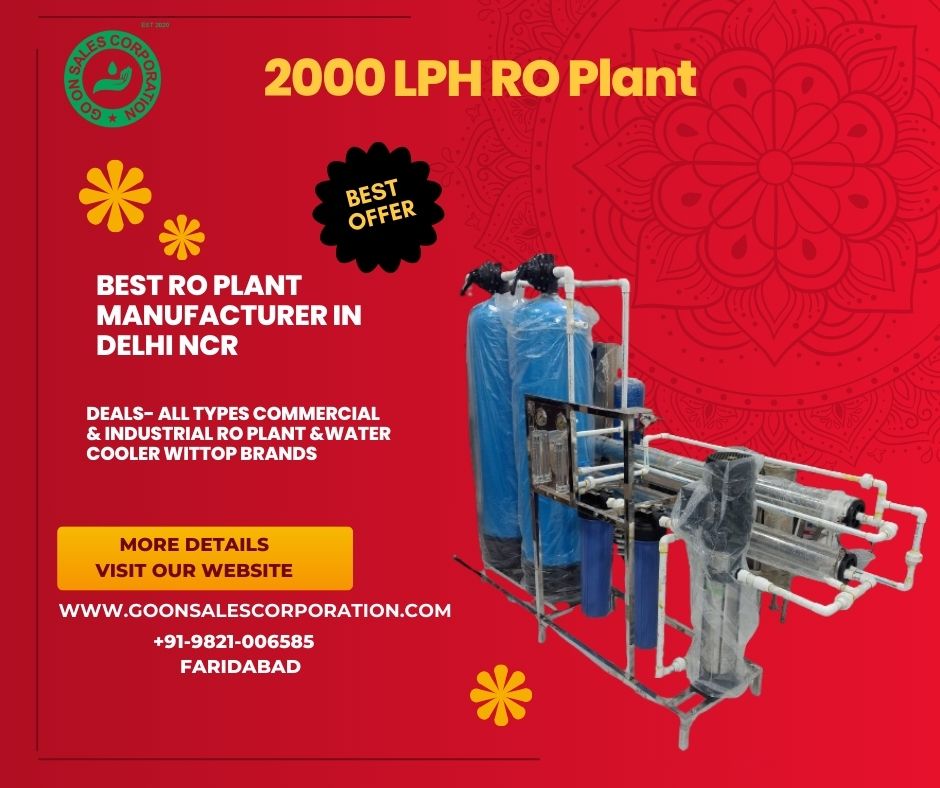
Introduction:-
Water is crucial for many industries, helping with efficiency, equipment protection, and meeting regulations. A 2000 LPH Reverse Osmosis (RO) plant offers a powerful solution by purifying 2000 liters of water per hour, making it suitable for industries of all sizes.
What is a 2000 LPH RO Plant?
Water is essential in many industries, helping with efficiency, protecting machines, and following rules. To purify large amounts of water, a 2000 LPH (Liters Per Hour) Reverse Osmosis (RO) plant is a great solution. This system can clean 2000 liters of water every hour, meeting the needs of different-sized industries.
In this article, we explain 2000 LPH RO Plant Specifications & Advantage works, for industries, and where it can be used.
Components of a 2000 LPH RO Plant
Raw Water Pump: This pump is responsible for providing pressure to the raw water, ensuring that it reaches the pre-treatment section efficiently.
Pre-treatment Unit: This section includes filters such as sand, carbon, and cartridge filters that remove large impurities and sediment from the water before it reaches the RO membrane.
High-Pressure Pump: This pump applies the necessary pressure to the water, forcing it through the RO membrane.
RO Membrane: The core of the system, this semi-permeable membrane filters out dissolved solids, chemicals, and contaminants, allowing only clean water to pass through.
Post-treatment Unit: Some systems may include a UV filter or other methods to ensure the water is free from bacteria and other biological contaminants.
Storage Tank: Purified water is stored in a tank for later use or distribution within the industrial facility.
2000 LPH RO Plant Specifications & Advantage.
Pharmaceutical Industry
- Usage: The pharmaceutical sector requires ultrapure water for manufacturing drugs, cleaning equipment, and formulation processes.
- Advantage: A 2000 LPH RO plant ensures that the water used in drug production is free from contaminants, bacteria, and dissolved salts.
Food and Beverage Industry
- Usage: In food processing, beverage manufacturing, and packaging, water quality is crucial for product safety, taste, and shelf life.
- Advantage: The 2000 LPH RO system provides high-quality water that meets health standards.
Textile Industry
- Usage: The textile industry uses large quantities of water for dyeing, finishing, and washing fabrics..
- Advantage: An RO plant improves water quality, reducing the risk of unwanted chemical reactions during the dyeing process and enhancing fabric durability.
Power Plants
- Usage: Power generation facilities use water in steam generation, cooling systems, and other processes. Impurities in water can cause scale build-up and reduce the efficiency of these systems.
- Advantage: The 2000 LPH RO plant ensures the water is free from minerals that could cause scaling, improving the performance and longevity of power generation equipment.
Automotive Industry
- Usage: Water is needed for various stages of automobile manufacturing, such as painting, cooling, and cleaning.
- Advantage: Using purified water from an RO plant ensures that vehicles are painted and cleaned without leaving mineral spots or contaminants.
Chemical Industry
- Usage: The chemical industry often requires water as a solvent in the production of chemicals, and water quality can directly impact the chemical reactions and the quality of the end products.
- Advantage: A 2000 LPH RO plant removes contaminants that could interfere with chemical processes, leading to higher-quality products and fewer impurities in the production c
Bottled Water Plants
- Usage: Bottled water manufacturers require a continuous supply of pure water for packaging and distribution.
- Advantage: The RO plant provides reliable, clean water, ensuring that bottled water meets the quality standards expected by consumers and regulators.
Hospitality Industry
- Usage: Hotels, resorts, and restaurants need purified water for cooking, cleaning, and serving guests, especially in regions where water quality is inconsistent.
- Advantage: An in-house RO system ensures that guests receive high-quality water for consumption.
Conclusion
The 2000 LPH RO plant is a versatile and essential tool for a wide range of industries, from pharmaceuticals and food processing to power plants and healthcare. By providing high-quality, purified water, it ensures that industrial processes are efficient, safe, and compliant with regulations.
This system improves water quality, saves money, protects equipment, and supports the environment. It’s a smart, long-term solution for industries requiring large amounts of water.

